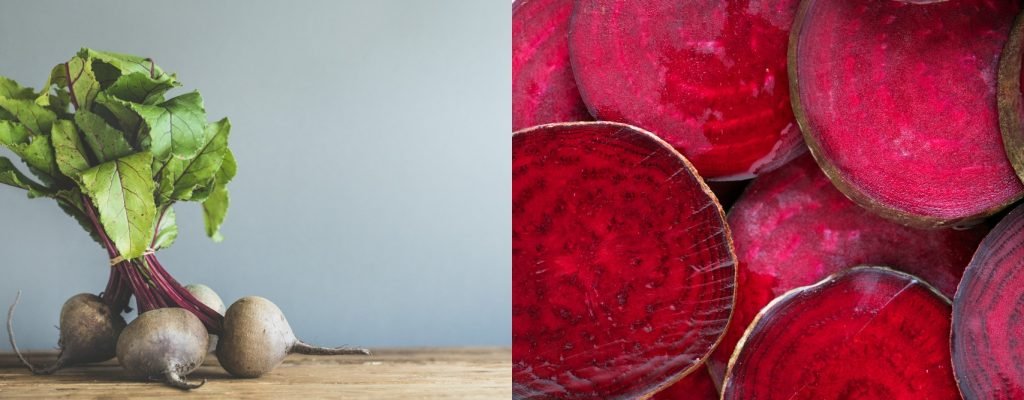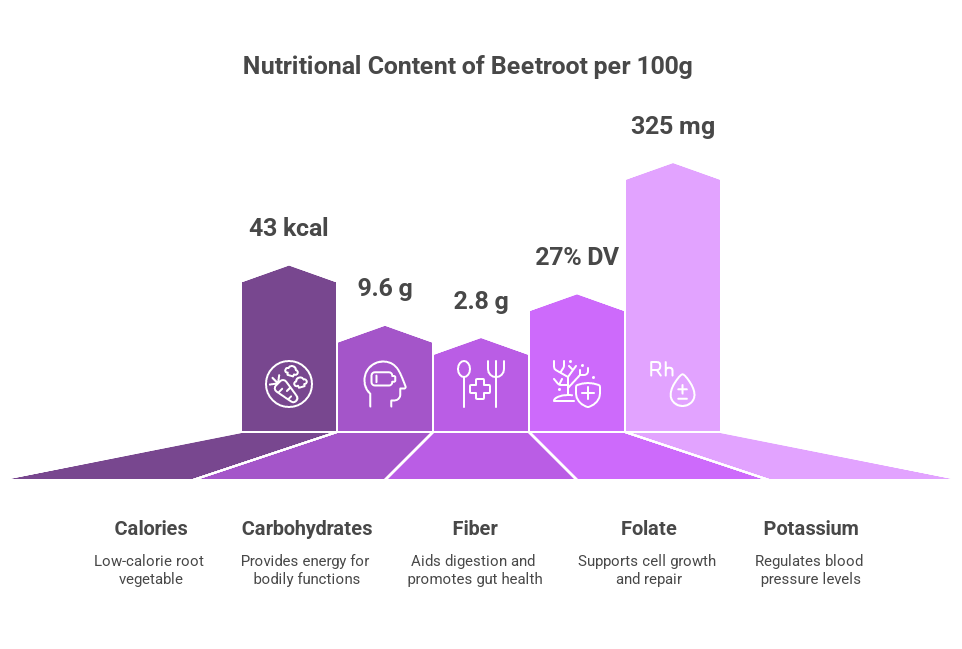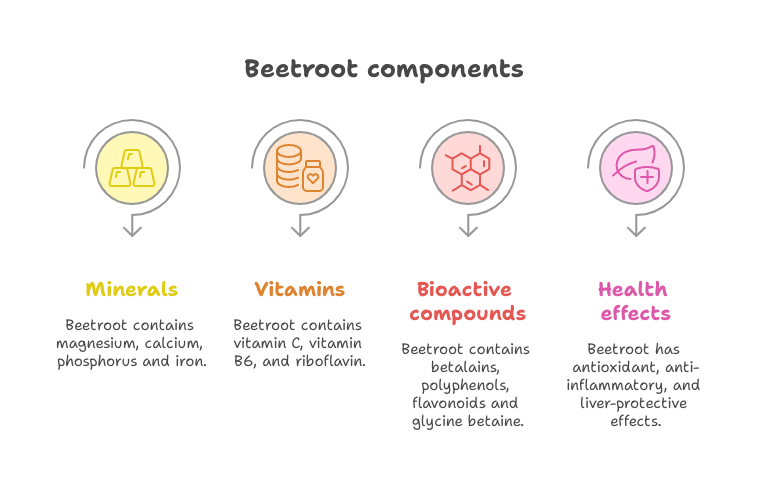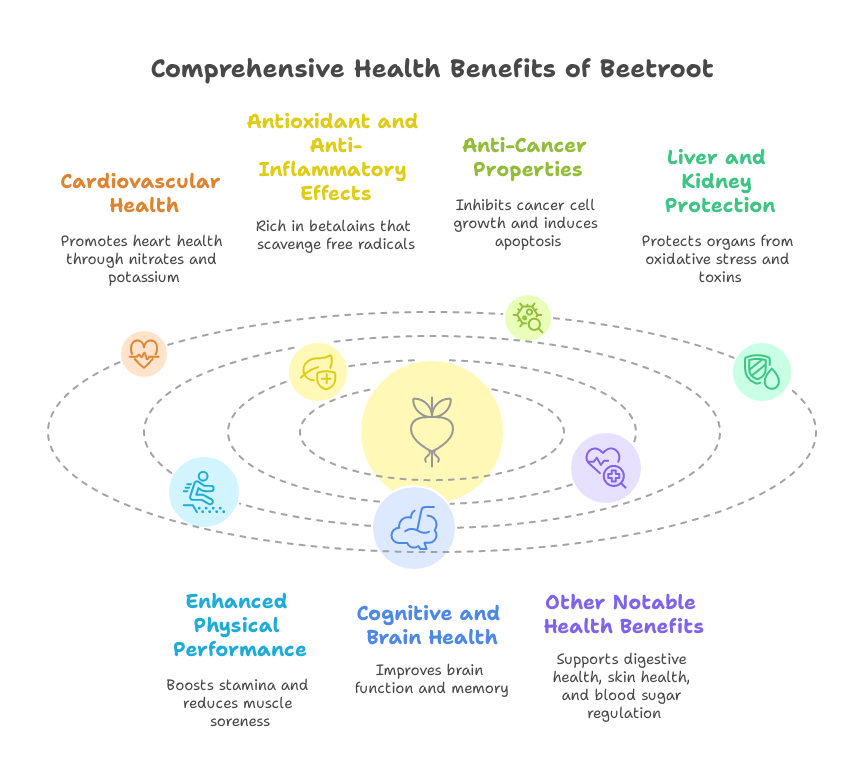Published on: 20 June 2025
Category: Wellness I Functional Foods & Nutraceuticals
Written By: Dewanshee Ingale, BPharm
Reviewed and Fact Checked By:
Samruddhi Jadhav B.Sc-Microbiology,

Beta vulgaris, commonly known as beetroot or simply beet, is the nutrient-rich taproot of a plant belonging to the Amaranthaceae family. It is a versatile, fast-growing annual crop, widely cultivated across diverse regions including Asia, the Mediterranean, Europe, Egypt, India, and Ukraine. Known for its adaptability and nutritional value, beetroot is primarily grown for its edible, fleshy taproot, which varies in color, ranging from deep red to golden yellow and even white.
Beetroot is cherished not only for its earthy-sweet flavor but also for its impressive health-promoting properties. Beetroot can be consumed in a variety of forms, raw, roasted, boiled, steamed, pickled, or canned, making it a highly versatile addition to any diet. The leaves of the beet plant, known as beet greens, are also edible and nutrient-dense, rich in fiber, antioxidants, and essential micronutrients.
The vivid red to purple coloration of beetroot is primarily due to betalain pigments, specifically betacyanins, which are chemically distinct from anthocyanins found in many other red or purple vegetables. These betalains, in combination with other bioactive compounds such as polyphenols, vitamins (like folate and vitamin C), and essential minerals (like iron, magnesium, and potassium), are responsible for many of the beet’s therapeutic effects, ranging from antioxidant and anti-inflammatory activity to cardiovascular and cognitive benefits.
Beetroot is increasingly being studied for its health benefits, including its various roles in strengthening cardiovascular health and offering antioxidants, and can also be used as a natural colorant.
Nutritional Constituents
Beetroot is a nutrient-dense root vegetable, low in calories (43 kcal per 100 g) and rich in essential nutrients. It provides 9.6 g of carbohydrates and 2.8 g of fiber and is an excellent source of folate (27% DV), supporting cell growth and repair. It also offers potassium (325 mg) for blood pressure regulation, along with smaller amounts of magnesium, calcium, phosphorus, and iron. Beetroot contains vitamin C, vitamin B6, and riboflavin, contributing to immune support and energy metabolism. Its standout bioactive compounds include betalains, polyphenols, flavonoids, and glycine betaine, known for their antioxidant, anti-inflammatory, and liver-protective effects. Beetroot is also a great source of dietary nitrates, which contribute to cardiovascular health.
This potent mixture of nutrients and phytochemicals, beetroot, supports cardiovascular health, digestive wellness, and overall vitality.


Health Benefits of Beetroot

Cardiovascular Health
Beetroot promotes cardiovascular health through the synergistic effects of its high dietary nitrate and potassium content. The dietary nitrates in beetroot are converted into nitric oxide in the body, a molecule that helps relax and widen blood vessels, leading to improved blood flow and a reduction in both systolic and diastolic blood pressure. This effect is well-supported by clinical trials, particularly those involving beetroot juice.
At the same time, potassium, another key nutrient in beetroot, contributes by helping to balance sodium levels and reduce tension in blood vessel walls, which offers additional support in maintaining healthy blood pressure. Together, these compounds make beetroot a valuable dietary addition for individuals aiming to prevent or manage hypertension and reduce the risk of heart disease and stroke.
Antioxidant and Anti-Inflammatory Effects
Beetroot is rich in potent antioxidants, primarily due to its high content of betalains, especially betanin, alongside other bioactive compounds that exhibit strong antioxidant and anti-inflammatory properties. A review on the Research of beetroot titled “Beetroot as a Functional Food with Huge Benefits” highlighted that betalains act as effective free radical scavengers and also stimulate the body’s endogenous antioxidant defense systems. Betanin, the most abundant betalain in beetroot, has been shown to neutralize a wide range of reactive oxygen species, including DPPH radicals, hydroxyl radicals, superoxide, and galvinoxyl, and even protect DNA from oxidative damage induced by agents like hydrogen peroxide. This antioxidant activity is believed to be mediated through the Nrf2 signaling pathway, which enhances the expression of protective proteins such as heme oxygenase-1 (HO-1), glutathione (GSH), and paraoxonase-1 (PON1).
Furthermore, betalains have been shown to inhibit the oxidative metabolism of neutrophils in humans, effectively reducing inflammation at the cellular level. They also enhance the activity of antioxidant enzymes such as peroxidase and superoxide dismutase in various tissues.
Anti-Cancer Properties of Beetroot
Beetroot exhibits promising anti-cancer properties, largely attributed to its high content of betalains, especially betanin, along with other bioactive compounds. A growing body of in vitro and in vivo studies indicates that beetroot and its constituents can inhibit cancer development through multiple pathways.
The key compound betanin has demonstrated the ability to inhibit the proliferation of cancer cells and induce apoptosis (programmed cell death) without harming healthy cells. It activates intrinsic apoptosis pathways by triggering the release of cytochrome c from mitochondria into the cytoplasm, leading to caspase-3 activation, disruption of mitochondrial membrane potential, and the generation of reactive oxygen species (ROS), ultimately resulting in cancer cell death. Moreover, beetroot extracts combined with chemotherapy have demonstrated synergistic effects, enhancing cytotoxicity against various cancer cell lines, including pancreatic, prostate, and breast cancers.
Liver and Kidney Protection
Beetroot is rich in antioxidants and bioactive compounds that help protect the liver and kidneys from oxidative stress and toxic damage. Multiple studies in both animals and humans have shown that beetroot juice enhances liver enzyme activity, reduces inflammation, and minimizes tissue injury caused by toxins or drug exposure.
In animal models, long-term beetroot supplementation prevented liver damage induced by hepatotoxins by activating the Nrf2 pathway and boosting the activity of phase I and II detoxification enzymes, thereby enhancing the body’s cellular antioxidant defenses. Human studies also report significant reductions in liver enzymes such as AST and ALT, particularly in patients with non-alcoholic fatty liver disease (NAFLD), indicating improved liver function.
Beetroot also exhibits nephroprotective (kidney-protective) effects. Rodent studies have demonstrated that beetroot extract can reverse drug-induced renal toxicity by lowering inflammation markers, reducing oxidative stress, and improving renal tissue integrity.
Enhanced Physical Performance
Beetroot juice is widely recognized among athletes and fitness enthusiasts for its ability to boost stamina and reduce muscle soreness. Its high nitrate content is converted into nitric oxide in the body, which enhances muscle oxygenation during exercise. This leads to improved stamina, greater energy efficiency, and reduced fatigue, making workouts more effective and less taxing. As a result, beetroot juice has become a popular natural performance enhancer and recovery aid in the world of sports and physical fitness.
Cognitive and Brain Health
The dietary nitrates in beetroot not only benefit cardiovascular health but also play a significant role in supporting brain function. By increasing the production of nitric oxide, beetroot helps enhance cerebral blood flow, which is crucial for maintaining cognitive performance, especially in older adults
Improved brain circulation has been linked to better memory, attention, and processing speed, and may help reduce the risk of dementia and other neurodegenerative conditions. Regular consumption of beetroot may therefore contribute to healthy aging and cognitive vitality.
Other Notable Health Benefits of Beetroot
Digestive Health
Beetroot is a good source of dietary fiber, which supports healthy digestion, promotes regular bowel movements, and fosters the growth of beneficial gut bacteria, contributing to overall gut health.
Skin Health
The enhanced blood circulation and anti-inflammatory properties associated with beetroot consumption may improve skin tone, reduce inflammation, and promote a clearer, more radiant complexion.
Blood Sugar Regulation
Emerging evidence suggests that beetroot may assist in regulating blood glucose levels due to its low glycemic load and antioxidant profile. While promising, more research is needed to establish its role in diabetes management.
Conclusion
Beetroot stands out as a nutritional powerhouse, offering a rich profile of essential vitamins, minerals, and potent phytochemicals. From improving cardiovascular health and enhancing athletic performance to protecting the liver, kidneys, and brain, beetroot delivers a wide range of science-backed benefits. Its high content of dietary nitrates, betalains, antioxidants, and fiber makes it one of the most valuable root vegetables for preventive and functional nutrition.
At Pharmacally, we recognize beetroot as more than just a superfood; it is a clinically supported functional food with the potential to complement modern therapeutic strategies. Whether you’re managing blood pressure, seeking natural ways to combat oxidative stress, or looking to support overall wellness, incorporating beetroot into your daily diet is a simple, natural, and effective step toward better health.
Reference
Marjan Nikan, Azadeh Manayi, Chapter 3.5 – Beta vulgaris L., Editor(s): Seyed Mohammad Nabavi, Ana Sanches Silva, Nonvitamin and Nonmineral Nutritional Supplements, Academic Press, 2019, Pages 153-158, https://doi.org/10.1016/B978-0-12-812491-8.00021-7.
Ceclu L, Oana-Viorela N (2020) Red Beetroot: Composition and Health Effects – A Review. J Nutri Med Diet Care 6:043. doi.org/10.23937/2572-3278.1510043
Deepali Mudgal et al, Nutritional composition and value added products of beetroot: A review, Journal of Current Research in Food Science 2022; 3(1): 01-09
Clifford T, Howatson G, West DJ, Stevenson EJ. The potential benefits of red beetroot supplementation in health and disease. Nutrients. 2015 Apr 14;7(4):2801-22. Doi: 10.3390/nu7042801. PMID: 25875121; PMCID: PMC4425174.
Baião DDS, Silva DVTD, Paschoalin VMF. Beetroot, a Remarkable Vegetable: Its Nitrate and Phytochemical Contents Can be Adjusted in Novel Formulations to Benefit Health and Support Cardiovascular Disease Therapies. Antioxidants (Basel). 2020 Oct 8;9(10):960. Doi: 10.3390/antiox9100960. PMID: 33049969; PMCID: PMC7600128.
Chen L, Zhu Y, Hu Z, Wu S, Jin C. Beetroot as a functional food with huge health benefits: Antioxidant, antitumor, physical function, and chronic metabolomics activity. Food Sci Nutr. 2021 Sep 9; 9(11):6406-6420. Doi: 10.1002/fsn3.2577. PMID: 34760270; PMCID: PMC8565237.
Carrillo C, Rey R, Hendrickx M, Del Mar Cavia M, Alonso-Torre S. Antioxidant Capacity of Beetroot: Traditional vs Novel Approaches. Plant Foods Hum Nutr. 2017 Sep;72(3):266-273. Doi: 10.1007/s11130-017-0617-2. PMID: 28620796.
Tan ML, Hamid SBS. Beetroot as a Potential Functional Food for Cancer Chemoprevention, a Narrative Review. J Cancer Prev. 2021 Mar 30; 26(1):1-17. Doi: 10.15430/JCP.2021.26.1.1. PMID: 33842401; PMCID: PMC8020175.
Lechner JF, Stoner GD. Red Beetroot and Betalains as Cancer Chemopreventative Agents. Molecules. 2019 Apr 23;24(8):1602. Doi: 10.3390/molecules24081602. PMID: 31018549; PMCID: PMC6515411.
Saber A, Abedimanesh N, Somi MH, Khosroushahi AY, Moradi S. Anticancer properties of red beetroot hydro-alcoholic extract and its main constituent; betanin on colorectal cancer cell lines. BMC Complement Med Ther. 2023 Jul 18; 23(1):246. Doi: 10.1186/s12906-023-04077-7. PMID: 37464362; PMCID: PMC10355081.
Violetta Krajka-Kuźniak, Hanna Szaefer, Ewa Ignatowicz, Beetroot juice protects against N-nitrosodiethylamine-induced liver injury in rats, Food and Chemical Toxicology, Volume 50, Issue 6, 2012, Pages 2027-2033, https://doi.org/10.1016/j.fct.2012.03.062.
Domínguez R, Cuenca E, Maté-Muñoz JL et al, Effects of Beetroot Juice Supplementation on Cardiorespiratory Endurance in Athletes. A Systematic Review. Nutrients. 2017 Jan 6;9(1):43. Doi: 10.3390/nu9010043. PMID: 28067808; PMCID: PMC5295087.
Arazi H, Eghbali E. Possible Effects of Beetroot Supplementation on Physical Performance Through Metabolic, Neuroendocrine, and Antioxidant Mechanisms: A Narrative Review of the Literature. Front Nutr. 2021 May 13;8:660150. Doi: 10.3389/fnut.2021.660150. PMID: 34055855; PMCID: PMC8155490.
Miraftabi H et al, Effects of Beetroot Juice Supplementation on Cognitive Function, Aerobic and Anaerobic Performances of Trained Male Taekwondo Athletes: A Pilot Study. Int J Environ Res Public Health. 2021 Sep 28; 18(19):10202. Doi: 10.3390/ijerph181910202. PMID: 34639501; PMCID: PMC8507686.

